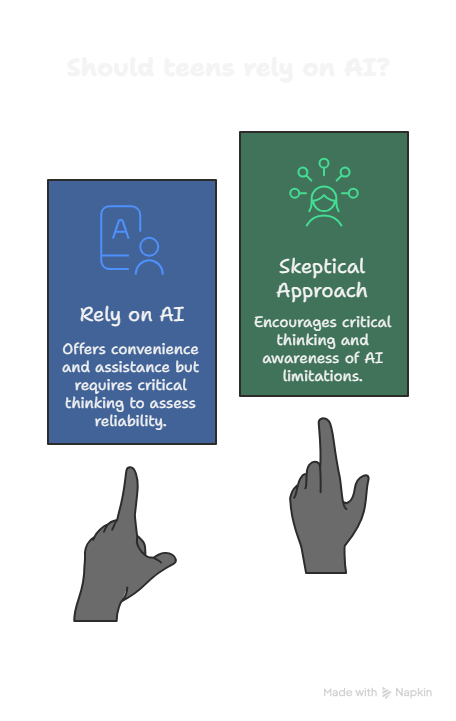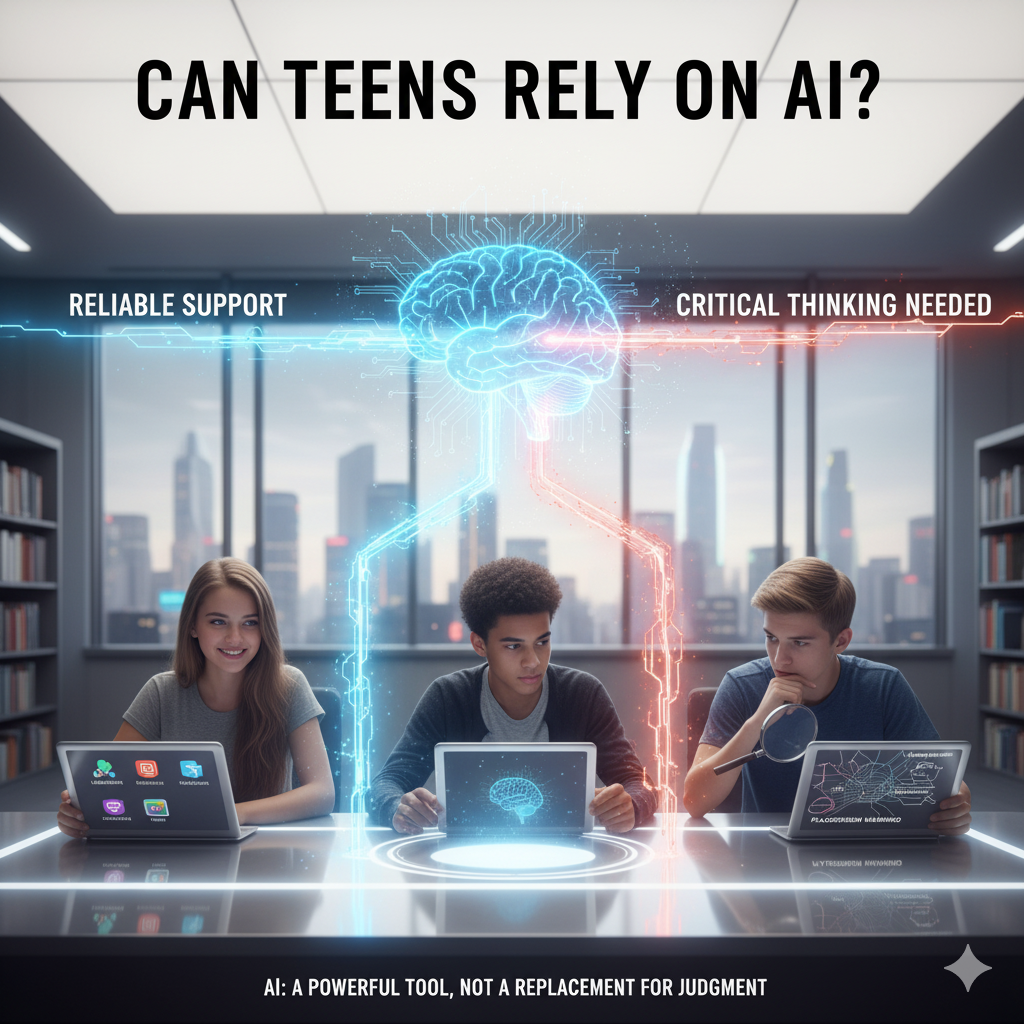Artificial Intelligence (AI) is shaping the way teens learn, communicate, and even express creativity. From AI chatbots that help with homework to apps that generate art or music, AI feels like a helpful companion in the digital age. But the big question remains: can teens truly rely on AI?
The answer isn’t simple. AI can be incredibly useful, but it comes with risks like bias, misinformation, privacy concerns, and the potential to affect mental health. This blog aims to guide teens on how to use AI responsibly while keeping safety and mental balance at the center.
Table of Contents
ToggleThe Promise of AI for Teens
For teens, AI opens doors to new opportunities:
-
Education Support – AI-powered tools explain tough concepts, create practice quizzes, and even assist with writing.
-
Creative Boost – Teens can generate artwork, write stories, or compose music with AI tools.
-
Career Preparation – Learning AI today gives teens an edge in future job markets.
-
Personal Assistance – From health reminders to time management apps, AI helps teens stay organized.
AI can act like a supportive mentor or partner—but only if it’s used wisely.
The Risks of Relying Too Much on AI
1. Bias in AI Responses
AI is trained on data created by humans. If that data includes stereotypes or unfair assumptions, AI can unintentionally pass them on. For example, it might favor certain perspectives or leave out important voices. Teens must understand that AI isn’t always neutral.
2. Safety and Privacy Concerns
AI tools often collect data, and sharing personal details can create risks. Teens should be careful not to share private information such as home addresses, school names, or personal photos with AI platforms.
3. Misinformation and Accuracy
AI can sometimes “hallucinate,” giving answers that sound convincing but are factually wrong. Relying on such information without cross-checking can lead to misunderstandings.
4. Mental Balance
Overusing AI chatbots or apps can make some teens less engaged in real-life activities. It can also create dependency, where teens feel they can’t solve problems without AI. Finding balance is key.
Smart Ways Teens Can Use AI
1. Double-Check Information
AI can be a great source of ideas, but facts should always be confirmed with trusted resources—teachers, books, or verified websites.
2. Protect Your Privacy
A golden rule: if you wouldn’t share something with a stranger, don’t share it with AI. Avoid entering sensitive details into chatbots or apps.
3. Use AI for Learning, Not Cheating
Instead of asking AI to write essays or solve math problems directly, teens can use it to learn step-by-step solutions or brainstorm ideas. This way, AI supports growth rather than replacing effort.
4. Balance Digital and Offline Life
AI is powerful, but so is spending time with family, friends, and hobbies. Teens should aim for balance so that technology doesn’t take over real-life experiences.
5. Build Awareness of Bias
Teens should develop a critical mindset. Asking questions like, “Where does this information come from?” or “Could this be biased?” helps them use AI responsibly.

Role of Parents and Teachers in AI Guidance
Parents and educators play a big role in ensuring teens benefit from AI safely:
-
Encourage Conversations – Talk about how AI is used daily and what risks come with it.
-
Model Good Practices – Adults who use AI responsibly set strong examples.
-
Provide Safe Resources – Direct teens toward AI platforms that prioritize learning and privacy.
-
Teach Critical Thinking – Encourage questioning rather than blind trust in AI responses.
Can Teens Rely on AI in the Future?
AI is constantly improving, but it will never be perfect. Teens can rely on AI as a support tool, but not as the sole authority. The future belongs to those who can use AI thoughtfully, combining its power with human judgment, creativity, and empathy.
The goal is not blind trust, but informed reliance—where AI helps but doesn’t control.
FAQs
Q1. Can teens fully trust AI?
No, teens should use AI as a helpful guide but not as an unquestionable authority. AI can make mistakes, show bias, or provide incomplete answers.
Q2. What are the biggest dangers of AI for teens?
Privacy risks, misinformation, bias, and over-reliance are key dangers. Responsible use helps avoid these issues.
Q3. How can teens protect themselves while using AI?
They can avoid sharing personal data, fact-check AI responses, and limit screen time to protect mental balance.
Q4. Should parents let teens use AI freely?
Supervision is important. As teens rely on AI more for learning and creativity, parents shouldn’t ban it—but guide them toward safe, ethical, and balanced use instead.
Yes, excessive use can cause dependency or reduce real-world interactions. However, mindful use can actually support well-being through learning and productivity.
Final Thoughts: Can Teens Rely on AI?
AI is an amazing resource for teens, but relying on it blindly is risky. By understanding bias, protecting privacy, and maintaining mental balance, young users can ensure AI works for them, not against them.
The digital age calls for awareness and responsibility. Teens who learn to balance AI use with real-life skills will not only adapt to the future—they’ll shape it. Teens need to become 10X AI Leaders for the Future—individuals who use AI wisely, lead with ethics, and harness innovation to create meaningful change.

